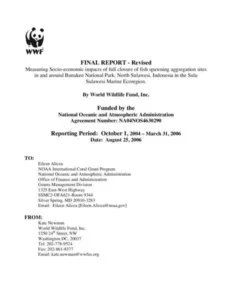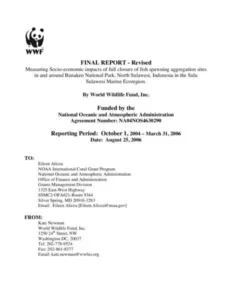
The objectives of this project were three-fold:
(1) Enhancing local capacity through a training workshop on the socio-economic methodology described in the GCRMN/NOAA/WCPA/AIMS Socioeconomic Manual for Coral Reef Management.
(2) Implementation of on-site socio-economic assessments using the aforementioned methodologies in and around Bunaken National Park, and
3) Designing a long-term regular monitoring program to assess actual impacts of full closure once effective.
The project helped deliver the target set in WWF’s Action Plan (WAP) for the Sulu Sulawesi Marine Ecoregion (SSME). In the WAP for the SSME, Indonesia should contribute to all targets, especially for the Priority Conservation Areas of Derawan Archipelago and Bunaken, for the green turtle as a priority marine species and for the live reef fish, tuna and shrimp industries. Project targets are described below. This project in Bunaken contributed particularly to Targets 1 and 2.
WAP Target 1: Prevent further degradation of existing coastal habitats (mangroves, sea grasses and coral reefs).
WAP Target 2: Prevent decline of 50% of biologically viable fish populations.
WAP Target 3: Species of ecoregional importance (defined as important for maintaining ecological processes within the ecoregion), specifically turtles, cetaceans and elasmobranches, adequately protected in the first 10 years to stop population declines and in the second 10 years to see gradual improvement in population levels.
WAP Target 4: Ecoregional conservation implementation requirements identified and supported through the design of an ecoregional business plan.
 English
English